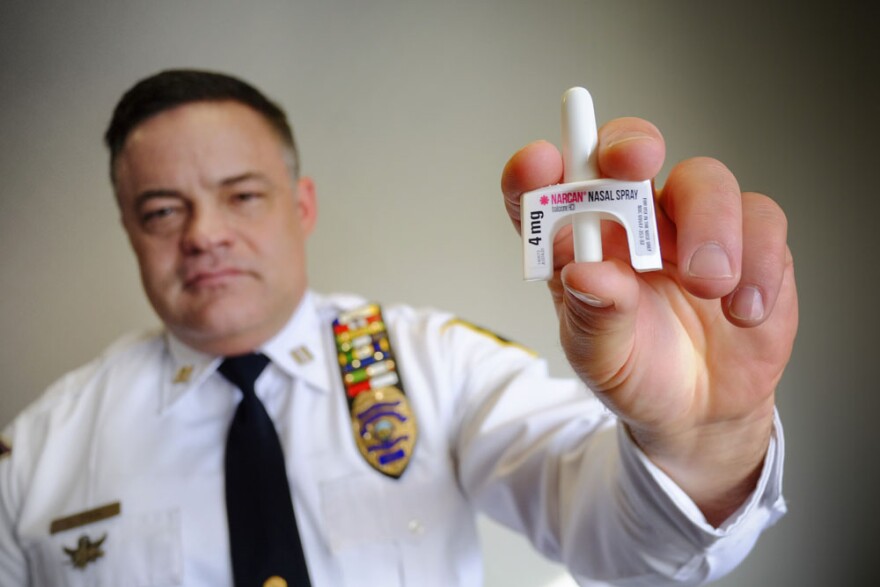The drug naloxone has become key in saving lives from opioid overdoses. It’s such a vital tool for fighting the opioid epidemic that many law enforcement officers in North Carolina now carry it with them at all times.
But there are still many agencies in the state not carrying it. And many of them are in counties hard hit by the opioid epidemic.
We don't live in a utopia. Surely your Mecklenburg Counties, your Wake Counties, you know big metropolitan police agencies, they can afford the stuff. -Sampson County Sheriff Jimmy Thornton
21 of North Carolina’s 100 counties have no law enforcement carrying naloxone. Many of these are rural counties with higher per-capita overdose death rates than the state’s major metro areas.
The reason many smaller agencies don’t carry naloxone is that there is no central distribution of the drug and no requirement to carry it. It's entirely up to each individual agency whether they want to carry naloxone or not.
Despite a steady rise in opioid overdoses over the past few years, some smaller departments would rather leave lifesaving to paramedics and firefighters.
Others worry about the cost. There are federal grants available but some small departments aren't aware of these funds or have been unsuccessful obtaining them.
And the retail price for naloxone, which is sold under the brand name Narcan, is prohibitive for smaller departments. The price can span from $50 for a Narcan nasal spray to $3,700 for a two-pack of auto injectors.
“We don’t live in a utopia,” said Sheriff Jimmy Thornton of rural Sampson County. “Surely your Mecklenburg Counties, your Wake Counties, you know big metropolitan police agencies, they can afford the stuff.”

Thornton hasn’t been able to convince Sampson County leaders to make money available for his agency to buy the drug -- so he’s currently relying on donated kits to give to his deputies.
“If I have limited resources, EMS and health department have limited resources as well,” he said. “It’s a matter of who they’re going to approve to obtain it and who’s going to pay for it.”
Thornton wants his deputies to carry the drug in case they're exposed to the opioid fentanyl, which is used as a pain medication and is 50 times more potent than heroin, according to the Centers for Disease Control and Prevention. If deputies carried naloxone they could theoretically revive a partner, although research shows cases of these accidental overdoses are extremely rare.
But law enforcement are low on the state’s priority list for receiving naloxone, with EMS agencies on top. North Carolina recently bought 40,000 naloxone kits in November. None of those went to law enforcement and the state doesn’t currently have plans to purchase additional naloxone kits.

The state wants law enforcement to carry naloxone, but EMS agencies are best for distributing the drug to opioid users and their families, according to Susan Kansagra, section chief for chronic disease and injury at the North Carolina Division of Public Health.
“Part of those (40,000) doses went to local EMS agencies to leave behind extra doses or to distribute directly to communities at high risk,” Kansagra said.
Opioid users and their families represent the majority of North Carolina’s 9,000 naloxone reversals since 2015, according to state data.
But over that same period, police and sheriff’s deputies have reported using the drug nearly 800 times. And the number of law enforcement reversals is doubling each year, according to state records.
This increase reflects the rise in opioid overdoses each year and the growing number of law enforcement agencies carrying naloxone.
North Carolina now has more law enforcement carrying naloxone than most other states, with 207 agencies carrying the drug, according to North Carolina Harm Reduction Coalition. And more agencies are currently in the process of acquiring it. In 2014, there were just 3 law enforcement agencies in the state carrying the drug.
This rapid rate of adoption is due in large part to an increasing desire among individual departments to carry the drug as officers witness more opioid overdoses.

The growth is also being fueled by NC Harm Reduction Coalition, which advocates for making naloxone widely available. The coalition donates kits to as many departments as it can and it trains law enforcement agencies how to use it.
The Fayetteville Police Department began its naloxone program at the urging of NC Harm Reduction. Since officers began carrying the drug in 2015, they’ve used it 127 times and saved 105 lives, according to department records.
Captain Lars Paul of the Fayetteville Police Department thinks police have a duty to carry the drug since they’re often the first to arrive when an overdose is taking place. There are also times when an active crime or accident scene may be too dangerous for paramedics or firefighters to enter.
“We may be there with an overdose victim for a few minutes until fire and EMS come. So in situations like that we administer naloxone,” Paul said. “If somebody’s not breathing it’s not good. I mean time is life in those situations.”







